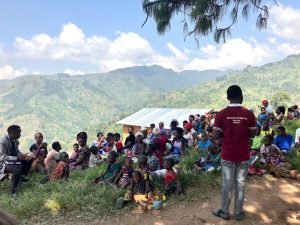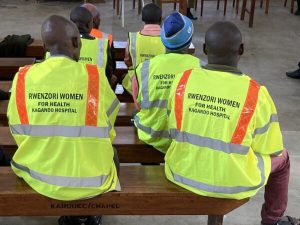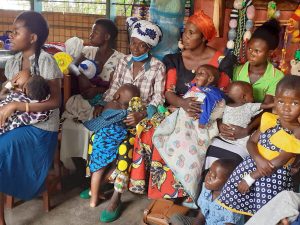RWENZORI WOMEN FOR HEALTH
Rwenzori Women for Health started at Kagando Hospital in 2012 to address the health needs of the community living in the Rwenzori Hills.
The aim is to empower women in rural areas to look after their own health, and that of their families and community. We incorporate the health needs of men as well and are greatly encouraged when men support their women on the various Outreaches.
Over the years RWFH has evolved from a once weekly programme to a full time project employing 2 nurses, and incorporating other health support staff and field workers, with twice weekly outreaches to rural villages in the area, teaching a range of health education topics.
Having a base at the hospital allows contact with patients and their attendants and gives an insight into what is going on in the community, and we are involved in the following projects based at Kagando.
The Rainbow room is open every afternoon for young patients at the hospital and those who are there with family members. There is play, laughter, singing and support from other families
Nutrition Classes take place weekly. Malnutrition in this area is not only due to poverty and weather affecting the crops but also for some a lack of nutritional knowledge. Children with disabilities are at particular risk. Cooking and eating a meal together at the Rainbow room with its traditional oven helps mothers learn new ways to feed their children. The team also visits families in the community to offer extra support.
Menstrual Pads: Menstruation brings many challenges. Although disposable pads can be bought in drug stores many cannot afford them. We teach women and girls how to hand stitch pads, and talk to them about puberty, as the majority of the mums don’t tell their daughters about periods. We talk about menopause, as well, for even the older women are not well informed about this! Those who are keen to make pads are given a ‘starter pack’ of scissors, needles and material. Learning how to make pads not only helps the women to manage their menstrual hygiene but can be a source of income selling pads to others.
A BodaBoda is a motorbike used as a taxi, and often as an ambulance. Women often ride side-saddle, with children either strapped to their backs or squeezed haphazardly between other passengers. The drivers are a marginalised group, with a reputation for drinking and drug taking. This not only has a knock on effect on their driving but also on their families, with many wives suffering from domestic abuse. RWFH has organised workshops for drivers to encourage more awareness of safety.
Health Screening: In March 2023 RWFH reinstated its Community Health Screening Programme. Over a period of 4 days we screened 653 clients in 3 villages and a coffee factory for Hypertension, Diabetes, HIV, Malnutrition, Breast examination, and Cervical Cancer. Any with abnormal results were referred to Kagando Hospital. In 2024, the exercise was very successiful with high numbers screened for different health conditions.

Photo above: RWFH hospital staff during the community out reach program

Photo above: Motorbike training

Photo above: Nutrition Training






